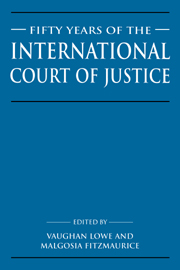Book contents
- Frontmatter
- Contents
- List of contributors
- Preface
- List of abbreviations
- Sir Robert Yewdall Jennings, by Vaughan Lowe
- List of publications of Sir Robert Jennings
- Table of cases
- Part I The International Court of Justice
- Part II The sources and evidences of international law
- Part III Substance of international law
- Part IV Procedural aspects of the work of the International Court of Justice
- Part V The International Court of Justice and the United Nations
- 32 The General Assembly, the International Court and self determination
- 33 The International Court of Justice and the Security Council
- Index
32 - The General Assembly, the International Court and self determination
Published online by Cambridge University Press: 02 November 2009
- Frontmatter
- Contents
- List of contributors
- Preface
- List of abbreviations
- Sir Robert Yewdall Jennings, by Vaughan Lowe
- List of publications of Sir Robert Jennings
- Table of cases
- Part I The International Court of Justice
- Part II The sources and evidences of international law
- Part III Substance of international law
- Part IV Procedural aspects of the work of the International Court of Justice
- Part V The International Court of Justice and the United Nations
- 32 The General Assembly, the International Court and self determination
- 33 The International Court of Justice and the Security Council
- Index
Summary
INTRODUCTION
It is a paradox that among controversial and uncertain fields of modern international law, few seem more controversial or less certain than self-determination; that the problem of self-determination has been central to the history – and to a lesser but still significant extent the jurisprudence – of the International Court; yet that so little has been written directly about the contribution of the Court to this field.
The distinction between the history and the jurisprudence of the Court is apposite. Important pronouncements of the Court on a wide variety of issues occurred in cases that directly or indirectly involved the processes of colonization and decolonization. This is true of decisions in the procedural field – for example, the impact of the dissolution of the League of Nations on substantive obligations and on jurisdictional clauses, mootness, the procedural issues arising from third party status. But it is also true in many areas of substantive law, as witness decisions on the competence of United Nations bodies, on the binding effect of decisions of the Security Council, on the status of African territories and peoples in the nineteenth century, to give only some examples.
Other, perhaps even more important, principles derive from cases occasioned by decolonization or its immediate aftermath – for example, the ‘objective’ legal personality of the UN, and its implied powers in the field of peacekeeping.
But the work of the Court in the field of self-determination and decolonization has not been merely the occasion for international law on other topics.
- Type
- Chapter
- Information
- Fifty Years of the International Court of JusticeEssays in Honour of Sir Robert Jennings, pp. 585 - 605Publisher: Cambridge University PressPrint publication year: 1996
- 3
- Cited by



